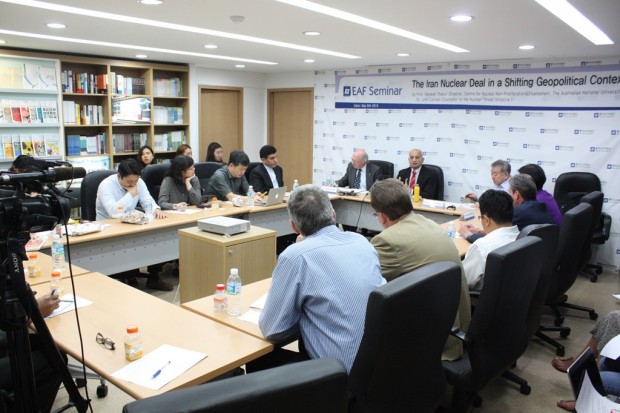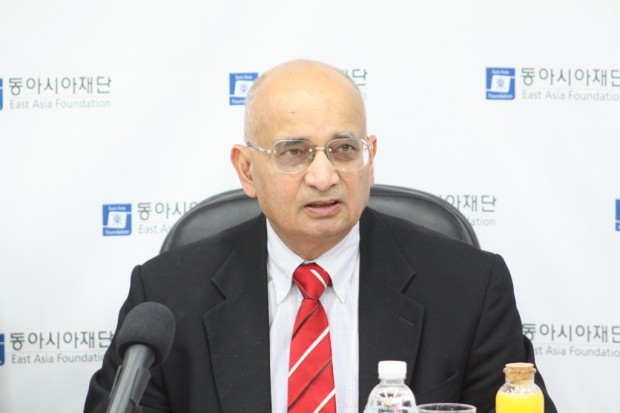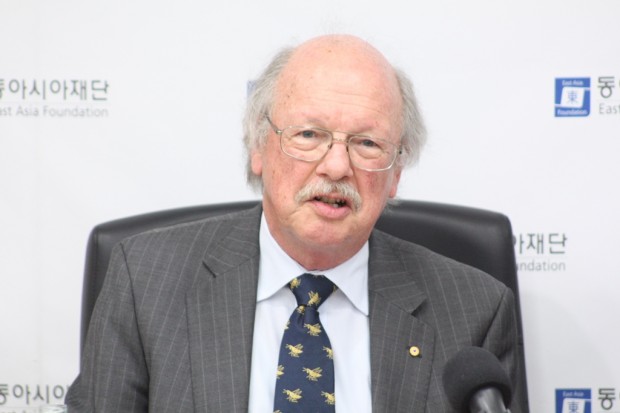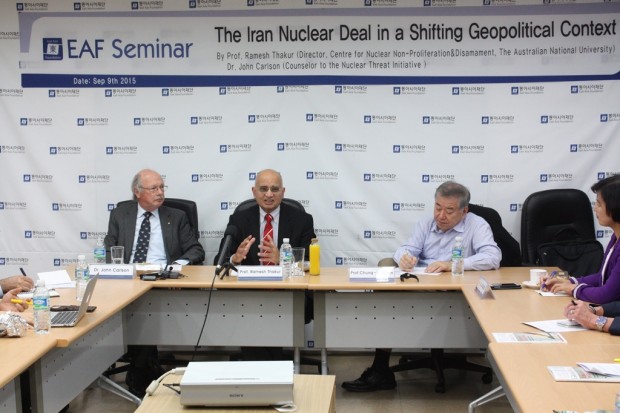
In Seoul’s East Asia Foundation and in the presence of a large number of journalists, from different countries, a forum was held to discuss the Iran nuclear deal titled, “Iran nuclear deal in a shifting geopolitical context”.
The forum was moderated by Moon Chung In, professor in department of political science in Yonsei University, and hosts two speakers: Prof. Ramesh Thakur, director of center for nuclear non-proliferation and disarmament, Australia National University, and Dr. John Carlson, counselor to the nuclear threat initiative, also attended the conference a delegate from Iran’s embassy.
In light of recent joint deal that includes (Iran, The United States of America, United Kingdom, Russia, France, China, Germany, & European Union) a discussion seminar was held, that deal’s main focus is redesigning and converting and reducing the nuclear facilities in Iran, and making Iran accept the additional protocol in order to lift all nuclear-related economic sanctions.
It’s important to mention that among the global responses, South Korea welcomed this framework for the nuclear deal.
Thakur, who worked previously in the United Nations, began the discussion as he took a more political approach to the issue of the nuclear deal, starting with the reason behind initiating the deal, as according to him Iran and its nuclear activity has a huge influence on the region, if Iran decides to have a nuclear activity, so will the neighboring countries.
As Iran is already surrounded by a number of countries with nuclear weapons, so understanding their reasoning isn’t that hard, according to Thakur, as they’ve been a victim of Saddam Hussein’s attacks in the past, and after Saddam’s death, the balance of power changed dramatically.

He also notes that Iran is different from other nuclear-holding countries, like Pakistan & North Korea, as its democratic compared to other countries, and their history in violence is tolerable as well, and it’s a democratic company when compared to others, especially going back to its secular past. Besides, it was never proved, with solid evidence, that Iran had had nuclear weapons, Thakur says.
When taking a look at the deal, Thakur notes that both Iran and the USA are damaged equally from the deal, but the USA’s approach to Iran changed over time from “No nuclear efforts whatsoever” to “No nuclear weapons” and that’s what they managed to achieve by this deal, that Iran would have some limited nuclear activities but wouldn’t have the ability to use it as a weapon.
He declares that the hostility between Iran and the USA ever since the Islamic Revolution in Iran shaped the whole region’s politics ever since. But it’s extraordinary that all sides accepted the deal’s peacefully, because according to him, the only alternatives were either more sanctions or military strikes.
He ends his speech with noting how the world looks differently at Israel possessing nuclear weapons, and the possibility of Iran possessing the same nuclear weapons.
After that, Carlson, who worked with the Australian government, on its nuclear understanding efforts, looks at the deal from a technical point of view.

He sees that the mere prospect of Iran’s willingness to abide by the deal protocols shows a serious preparation from the Iranian government. He also likes to note that in this legally binding agreement, there are a lot commitments, some are long-terms, but others appear to be ongoing like prohibiting Iran from potential weapon activities, and reprocesseing, despite Iran’s plans to pursue enrichment activities.
But he addresses the Iranian mindset and confirms two key issues that must be addressed, firstly being concerns about security of fuel supply, secondly being nuclear weapon opinion option as strategic deterrent, dealing with “dangerous neighborhood”.
He explains that Iran isn’t confident in depending on foreign sources for fuel, and lack of security would give Iran the more reason to try to be more self-dependent.
He purposes international fuel guarantees, fuel banks, and fuel partnerships to step in as a solution for security of supply issue. As he says that a solution that meets Iran’s needs, with meet other countries’ needs.

Among the questions asked, was the question asked by the moderator himself who asked, since Obama’s strategy worked with Iran, is it possible that his policy would work with North Korea? To that, Thakur replied that Obama is too late in initiating this sort of solution with North Korea. And in North Korea’s case, USA isn’t the main player. But he says that others could learn a lesson from the strategy Obama used with Iran, as it proves that negotiations could work out eventually.
The spokesman of Iran’s embassy had a statement saying that Iran’s only purpose was to have peaceful nuclear activities and facilities, and that’s the Iranian people’s dream as well. Using nuclear power in weaponry was never part of their plan.




